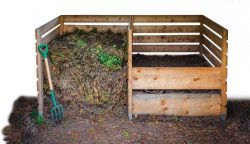| Your guide to green living in Montgomery County, MD |

Did you know that composting transforms your yard and garden trimmings, such as grass clippings, leaves, and garden prunings, into a dark, crumbly, sweet-smelling material that naturally enriches the soil?
When you compost, you create an environment for organisms to break down carbon-rich “brown” material, such as dried leaves and wood chips; and nitrogen-rich “green” material, including grass clippings and flowers. The carbon and nitrogen materials decompose and become a high-nutrient soil amendment that you can mix into soil and use in your garden.
All it takes is a compost bin (preferably), a mixture of organic materials, water, a pitchfork or shovel, and some time.
 Start with yard trim (grass, leaves and garden prunings). It’s simple and has little risk of attracting pests, such as rodents and insects. And, it saves time from having to place yard trim in a reusable container or in a paper lawn bag and putting it at the curb for yard trim recycling collection.
Start with yard trim (grass, leaves and garden prunings). It’s simple and has little risk of attracting pests, such as rodents and insects. And, it saves time from having to place yard trim in a reusable container or in a paper lawn bag and putting it at the curb for yard trim recycling collection.

To learn more about composting yard trim, including locations where County residents can pick-up a backyard compost bin at no additional charge, visit MontgomeryCountyMD.gov/yardtrim.
Composting food scraps, such as vegetable peelings, requires more steps and monitoring, to reduce odors and the risk of pests.
Montgomery County, Maryland requires the use of a rodent-proof compost bin, with a tight-fitting lid, to compost food scraps. Adding food scraps in an open compost pile or in a compost bin with no lid, is problematic because this attracts rodents and other pests. The compost bins currently provided by the County are designed for composting yard trim, because they are completely open on the top and the bottom and have aerating holes all around the sides. Please keep food scraps out of these bins. During FY21, we will evaluate and test a variety of compost bins that successfully deter rodents and demonstrate their effectiveness and use.
For more information on food scraps recycling, visit our website.
Try worm bin composting. Check out our next series of blog posts on worm bin composting.
Residents may also consider separating their food scraps for recycling and hiring a collector who will collect and deliver the food scraps to a composting facility in the region. Your food scraps will be used to create a great compost material.
If you’re interested, here is a list of food scraps recycling collectors serving Montgomery County customers. (Please note that Montgomery County has compiled this listing through various sources and does not present it as a complete directory of all vendors that provide service in Montgomery County, nor offer it as an endorsement of any of the companies listed.)
Compost Cab
202-695-2020
http://www.compostcab.com
Compost Crew
301-202-4450
http://www.compostcrew.com
EnviRelation
202-465-4802
http://www.envirelation.com
Key Compost
240-608-0283
http://www.keycompost.com
Organic Agriculture Recycling, LLC
christopher_br@hotmail.com
240-898-7284
Organic Waste Haulers
301-755-9286
http://www.organicwastehaulers.com
Veteran Compost
410-935-6404
http://www.veterancompost.com
Apple Valley Waste
877-267-1280
http://www.applevalleywaste.com
Bates Trucking
301-699-3268
http://www.batestrucking.com
Waste Management
301- 340-0774
http://www.wm.com
I am very interested in the food scrap composting bin when it becomes available.
Terrific, we will keep everyone updated!
I would like you to please send me information on how to get a compost bin for food scraps because I’m interested in composting.also I would like a truck loaded with wood chips to be delivered to my house if you can get me information I would appreciate it so much thank you
I am interested in advice concernimg food scrap composting. What kind of containers are best for excluding animals? I see so many available for sale, and I have no idea how to evaluate them. Information would be greatly appreciated!